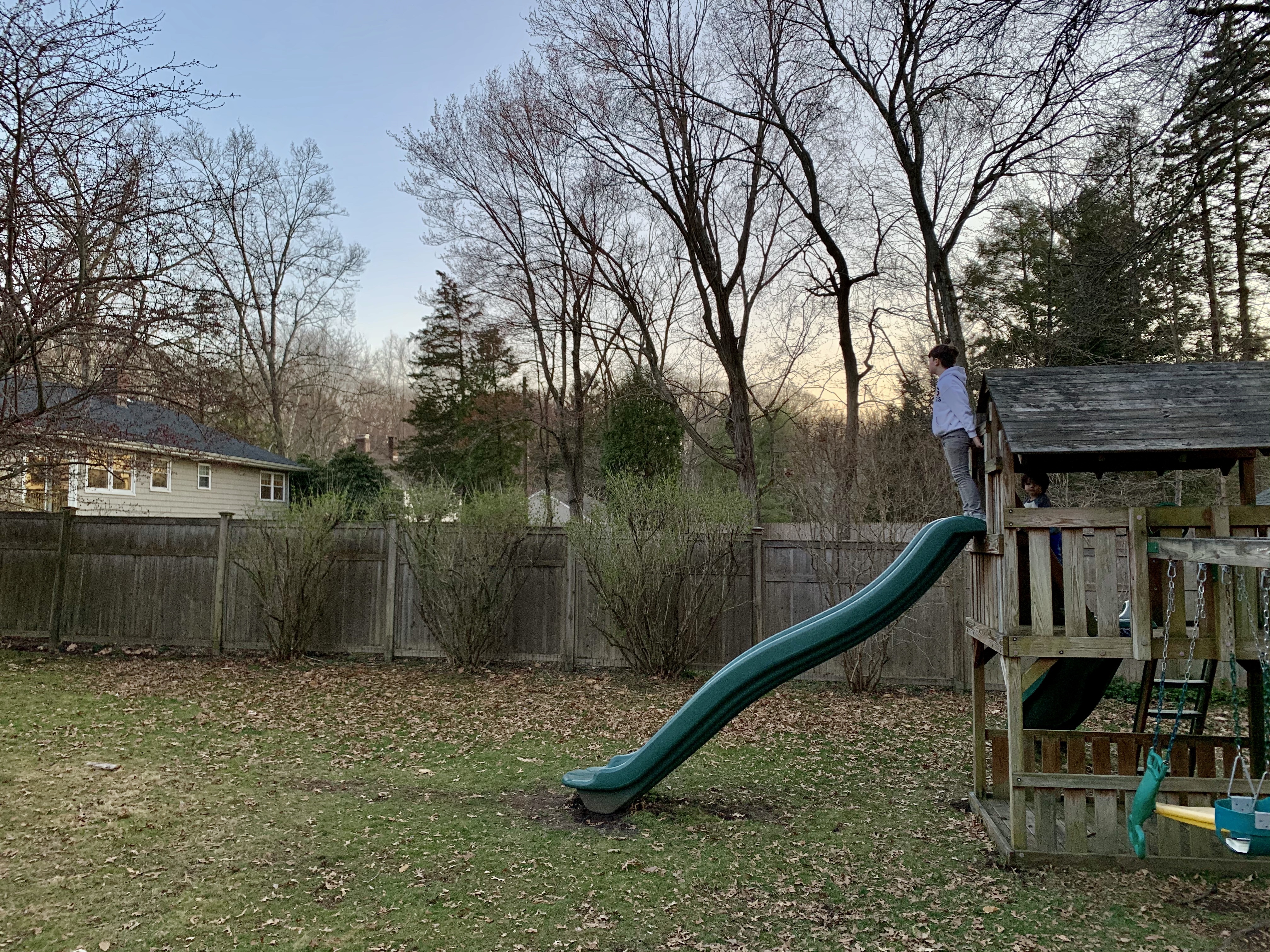Your Teen’s (or Tween’s) Mental Health During the COVID-19 Pandemic

The coronavirus that causes COVID-19 continues to spread throughout the world, and local governments are pushing to slow the virus’ spread by encouraging social distancing and enforcing shutdowns of schools and nonessential businesses. People have been told repeatedly that they must stay home. In teens’ terms: everyone is grounded.
I’ve come across a lot of suggestions for activities to do with your young children while we stay at home during social distancing. But what about our older children? This necessary step of slowing spread of the virus during trying times looks exactly like their worst kind of punishment, but they did nothing wrong.
School is more than academics. It’s where young people explore new topics, an experimental zone of learning what interests you. It’s about finding a love of learning and socializing with people who laugh at the same things you do and who you can tell things you’re starting to not want to tell your parents. Middle school and high school are about exploring your identity outside of your nuclear family, and most of this is done through the way a tween or teen interacts with their peers. How are our children going to navigate this complicated time in their lives without traditional social interaction? Even if our kids stay caught up with their academic lessons, what of life lessons?
Generation Z has already been determined to be less social, less experimental, more anxious and more depressed. And now they’re in the middle of a global health crisis unlike anything we’ve experienced before.
Maintain Screen Time Rules.
Screen time is a hot topic in parenting circles. Most parents feel like they’re allowing too much screen time, even if they know that their child is allotted significantly less than their peers. If you’re concerned about screen time at all and its effects on the developing brain, it always feels like the kids are getting too much.
Right now, I wish someone would limit my screen time. I’m having a hard time pulling away from the constant news cycle warning us of what is to come and bringing awareness to our failed systems. Less screen time for your teen means less opportunity to consume information about devastation and doom. Boundaries are gifts to your children, as it’ll help them create their own boundaries as they grow older.
If you’re overwhelmed by caring for your young children for far more hours a day than you’re used to, I get wanting to flip the TV on. But a teen or tween has already had years to get used to the screen time rules you have in place and is well aware of alternatives. Let them do the alternatives, and stay in line with your values and standards. They’re already in front of a screen through the duration of their school day, do you really want older children vegging out in front of the TV all evening while the adults make three meals and clean up after them? Speaking of, you should probably…
Assign More Chores During Coronavirus Quarantine
Okay, I know I sound like THE WORST right now. No additional screen time AND more chores? You may be thinking, ‘I thought we weren’t supposed to be punishing them when they’ve done nothing wrong?’
You’re not. Do you punish yourself every night for making dinner by doing the dishes? Is your husband punishing himself for wearing too many clothes whenever he does the laundry? No! Chores and responsibilities are not punishments, they are a part of living. The more time spent at the house, the more tasks that become necessary for someone to do. That should not be shifted only to the parents.
It’s not just a matter of needing more help. For well being, people need a balance of activities that give them feelings of pleasure, closeness and achievement. Without extra curricular activities, the most opportunity your teen (or tween) has for feeling accomplished is by finishing another day of mounds of classwork without the added social benefit. Think of giving more chores to your quaran-teen as a gift to both parents and kids alike.
Emphasize the Need for Collaboration during the COVID-19 Pandemic
The only way that your teen won’t feel like they’re being punished in this process is by having a conversation about collaboration.
Talk to them about individuals doing what’s best for the team. Is that something they value? Can they think of ways that they’ve experienced this at school, in sports, or in their friend group? What about choices that were made within your community?
Once they’ve acknowledged the importance of collaboration, bring it home. Everyone is making sacrifices right now. People are losing their jobs, people are getting sick, and people are missing out. So it’s more important now than ever to work as a team.
Connect with your Teen
Teens have a reputation for holing themselves up in their room and ignoring the family. Because they have less access to their friends, it’s more important than ever to bridge the gap between you and your teen.
Think of things to do together. Let their interest be your guide. Watch a movie they’ve been wanting to see this weekend, play a game they like, or cook a favorite dish with them.
Think about your child’s love language. Have you been nourishing that in a way that makes them feel connected? Now is the time.
Acknowledge Feelings and Practice Gratitude with your Teen During the Pandemic
Teenagers also have a reputation for selfishness. Their brains are working differently than adults, so it definitely may look like a character flaw, but it’s not outside of the norm. When you discuss the negatives of this scary time, you find some hope and gratitude. If you’re reading this, you both are alive. That’s a start, build off of that.
Encourage Frequent Video Chats with Friends During Social Distancing
This is where I’m willing to make adjustments for screen time. I don’t need to tell you why relationships are important, or how essential connection is for mental health, but I did have to remind my middle schooler MANY times to download a platform he could use to stay in touch with his friends. If your child did most of their socializing at the school and less-so on the phone, you might have to push it for a while to make it happen.
I don’t generally allow social media or games on the phone for my middle schooler, but there’s a video chat app called Houseparty that I approved for him to get yesterday. Not only does it do video chat in groups, there are also game prompts for them to play with their friends during the conversation.
Send the Kids Outside While you Can

Encourage your Teen to Make a Goal to Pursue During Social Distancing
This is (hopefully) a once-in-a-lifetime occurrence where you have no pressure whatsoever the leave the house. No pressure to achieve anything grand or push productivity. I’ve seen a lot of suggestions from people to spend this time slowing down, meditating, and relishing being out of the rat race. I’ve also seen people who want to reorganize it all, do a bunch of projects they’ve been meaning to do, and set their sites on goals they’ve been wanting to achieve.
Setting a goal during the pandemic isn’t about achievement as much as it is about intention. Encourage your child to consider what their intention will be during this unique time. Even if it’s rest, what does rest look like? Is it tuning things out? Is it more sleep, earlier times in bed?
If they do want to achieve something bigger, like pursuing an interest, what are resources you can use to facilitate that? YouTube has tutorials on just about anything, but there are more specialized websites that may be of more value.
Getting intentional about this time provides another opportunity for achievement in a time which that is limited.
Be Cautious of What Can be Overheard
I was on a video call this morning with a friend talking about the virus, fuming about our country’s leadership and sharing concern for what the future looks like, knowing the financial repercussions for this on such a massive scale without the right policies to protect the people. In the midst of this doomsday discussion, my middle schooler walked in the room, though his office space is on the other side of our house.
He surely heard the murmur of me talking to someone other than a baby, so curiosity caused him to head my way. He said he was “stretching.” Mhmm.
But in that moment I was really aware of how sheltered I can let him be when we’re in the midst of this. How much information is just enough? How can I straddle informing him and not scaring him?
Take it Easy
Sure, I seemingly just gave you a list of guidelines to follow to protect your child’s mental health during our current global health crisis. But really, this list was also a reminder for me. These are stressful times for everyone (though I acknowledge that they are far more stressful for those who get sick, their families, the medical professionals and grocers on the front line and those that are un- or underemployed) and we’re all just trying to keep the peace in our homes.
Raising a teen or tween is hard. Their prefrontal cortex isn’t fully formed, they’re hormonal, impulsive, and still very unaware of how the world works. It’s much harder in times when you’re figuring out how the world will work after a catastrophe. There’s only so much we have control over in times like these. You won’t always be able to keep your patience with them, but you can make attempts to connect with them, encourage them to connect with others, keep them active, in the sunshine, and as safe as possible.
[…] ago, I had a full-on breakdown. The overwhelm of the crisis, trying to hold it together for my tween’s mental health, entertaining a toddler indoors most of the day, having triple the work around the house with more […]